- Home
- Chuck Palahniuk
Choke Page 6
Choke Read online
Page 6
Well, I guess if Jesus could die for my sins, I suppose I can soak up a few for other people. We all get our chance to play scapegoat. Take the blame.
The martyrdom of Saint Me.
The sins of every man in history landing square on my back.
“Eva,” I say. “Baby, sweetheart, little sister, love of my life, of course I’m sorry. I was a pig,” I say and look at my watch. “You were just such a hot tamale that I was out of control.”
Like I need this shit to deal with. Eva just stares at me with her big hyperthyroid eyes until a big tear splurts out of one eye and cuts through the powder on her wrinkled cheek.
I roll my eyes at the ceiling and say, “Okay, I hurt your little woo-woo, but that was eighty frigging years ago, so get over it. Move on with your life.”
Then her horrible hands come up, wasted and veined as tree roots or old carrots, and they cover her face. “Oh, Colin,” she says behind them. “Oh, Colin.”
She takes her hands away, and her face is hosed with eye juice. “Oh, Colin,” she whispers, “I forgive you.” And her face nods toward her chest, bobbing with short breaths and sniffs, and her terrible hands bring the edge of her bib up to wipe at her eyes.
We just sit there. Jeez, I wish I had some chewing gum. My watch says twelve thirty-five.
She wipes her eyes and sniffs and looks up a little. “Colin,” she says. “Do you still love me?”
These frigging old people. Jesus H.
And just in case you’re wondering, I’m not a monster.
Just like something in a frigging book, for real I say, “Yeah, Eva.” I say, “Yeah, for sure, I guess I can probably still love you.”
Eva sobs now, her face hanging over her lap, her whole body rocking. “I’m so glad,” she says, her tears dropping straight, gray stuff from her nose dripping right into her empty hands.
She says, “I’m so glad,” and she’s still crying, and you can smell the chewed-up Salisbury steak squirreled away in her shoe, the chewed mushroom chicken in the pocket of her smock. That, and the damn nurse is never going to get my mom back from her shower, and I have to be back at work in the eighteenth century by one o’clock.
It’s hard enough remembering my own past so I can do my fourth step. Now it’s mixed up with the past of these other people. Which defense attorney I am, today, I can’t remember. I look at my fingernails. I ask Eva, “Is Dr. Marshall here, do you think?” I ask, “Do you know if she’s married?”
The truth about myself, who I really am, my father and everything, if my mom knows then she’s too freaked out with guilt to tell.
I ask Eva, “Could you maybe cry somewhere else?”
Then it’s too late. The Blue Jay starts singing.
And Eva, she still won’t shut up, crying and rocking, her bib pressed to her face, the plastic bracelet trembling around one wrist, she’s saying, “I forgive you, Colin. I forgive you. I forgive you. Oh, Colin, I forgive … ”
Chapter 9
It was one afternoon when our stupid little boy and his foster mother were in a shopping mall that they heard the announcement. This was summer, and they were shopping for back to school, the year he was going to be in fifth grade. The year you had to wear shirts with stripes to really fit in. This was years and years ago. This was only his first foster mother.
Up-and-down stripes, he was telling her when they heard it.
The announcement:
“Would Dr. Paul Ward,” the voice told everybody, “please meet your wife in the cosmetics department of Woolworth’s.”
This was the first time the Mommy came back to claim him.
“Dr. Ward, please meet your wife in the cosmetics department of Woolworth’s.”
That was the secret signal.
So the kid lied and said he needed to find the bathroom and instead he went to Woolworth’s, and there, opening boxes of hair color, was the Mommy. She had a big yellow wig that made her face look too small and smelled like cigarettes. With her fingernails, she opened each box and took out the dark brown bottle of dye inside. She’d open another box and take out the other bottle. She put the one bottle in the other box and put it back on the shelf. She opened another box.
“This one’s pretty,” the Mommy said, looking at the picture of a woman smiling on the box. She switched the bottle inside with another bottle. All the bottles the same dark brown glass.
Opening another box, she said, “Do you think she’s pretty?”
And the kid’s so stupid he says, “Who?”
“You know who,” the Mommy said. “She’s young, too. I just saw the two of you looking at clothes. You were holding her hand, so don’t lie.”
And the kid was so stupid he didn’t know to just run away. He couldn’t begin to even think about the very definite terms of her parole or the restraining order or why she’d been in jail for the past three months.
And switching bottles of blond into boxes for redheads and bottles of black into boxes for blondes, the Mommy said, “So do you like her?”
“You mean Mrs. Jenkins?” the boy said.
Not closing the boxes just perfect, the Mommy was putting them back on the shelf a little messed up, a little faster, and she said, “Do you like her?”
And like this is going to help, our little stooge said, “She’s just a foster mom.”
And not looking at the kid, still looking at the woman smiling on the box in her hand, the Mommy said, “I asked you if you liked her.”
A shopping cart rattled up next to them in the aisle and a blond lady reached past to take a bottle with a blond picture but a bottle of some other color inside it. This lady put the box in her cart and got away.
“She thinks of herself as a blonde,” the Mommy said. “What we have to do is mess with people’s little identity paradigms.”
What the Mommy used to call “Beauty Industry Terrorism.”
The little boy looked after the lady until she was too far away to help.
“You already have me,” the Mommy said. “So what do you call this foster one?”
Mrs. Jenkins.
“And do you like her?” the Mommy said, and turned to look at him for the first time.
And the little boy pretended to make up his mind and said, “No?”
“Do you love her?”
“No.”
“Do you hate her?”
And this spineless little worm said, “Yes?”
And the Mommy said, “You got that right.” She leaned down to look him in the eyes and said, “How much do you hate Mrs. Jenkins?”
And the little cooz said, “Lots and lots?”
“And lots and lots and lots,” the Mommy said. She put her hand for him to take and said, “We have to be fast. We have a train to catch.”
Then leading him through the aisles, tugging his boneless little arm toward daylight outside the glass doors, the Mommy said, “You are mine. Mine. Now and forever, and don’t you ever forget it.”
And pulling him through the doors, she said, “And just in case the police or anybody asks you later on, I’m going to tell you all the dirty, filthy things this so-called foster mother did to you every time she could get you alone.”
Chapter 10
Where I live now, in my mom’s old house, I sort through my mom’s papers, her college report cards, her deeds, statements, accounts. Court transcripts. Her diary, still locked. Her entire life.
The next week, I’m Mr. Benning, who defended her on the little charge of kidnapping after the school bus incident. The week after, I’m public defender Thomas Welton, who plea-bargained her sentence down to six months after she was charged with assaulting the animals in the zoo. After him, I’m the American civil liberties attorney who went to bat with her on the malicious mischief charge stemming from the disturbance at the ballet.
There’s an opposite to déjà vu. They call it jamais vu. It’s when you meet the same people or visit places, again and again, but each time is the first. Everybody is always a stran
ger. Nothing is ever familiar.
“How is Victor doing?” my mom asks me on my next visit.
Whoever I am. Whatever public defender du jour.
Victor who? I want to ask.
“You don’t want to know,” I say. It would break your heart. I ask her, “What was Victor like as a little boy? What did he want from the world? Did he have any big goal he dreamed about?”
At this point, how my life starts to feel is like I’m acting in a soap opera being watched by people on a soap opera being watched by people on a soap opera being watched by real people, somewhere. Every time I visit, I watch the halls for another chance to talk with the doctor with her little black brain of hair, her ears and glasses.
Dr. Paige Marshall with her clipboard and attitude. Her scary dreams about helping my mom live another ten or twenty years.
Dr. Paige Marshall, another potential dose of sexual anesthetic.
See also: Nico.
See also: Tanya.
See also: Leeza.
More and more, it feels like I’m doing a really bad impersonation of myself.
My life makes about as much sense as a Zen koan.
A House Wren sings, but whether it’s a real bird or it’s four o’clock I’m not sure.
“My memory isn’t any good,” my mom says. She’s rubbing her temples with the thumb and index finger of one hand, and says, “I worry that I should tell Victor the truth about himself.” Propped on her stack of pillows, she says, “Before it’s too late, I wonder if Victor has a right to know who he really is.”
“So just tell him,” I say. I bring food, a bowl of chocolate pudding, and try to sneak the spoon into her mouth. “I can go call,” I say, “and Victor can be here in a couple minutes.”
The pudding is lighter brown and smelly under a cold dark brown skin.
“Oh, but I can’t,” she says. “The guilt is so bad, I can’t even face him. I don’t even know how he’ll react.”
She says, “Maybe it’s better Victor never finds out.”
“So tell me,” I say. “Get it off your chest,” I say, and I promise not to tell Victor, not unless she says it’s okay.
She squints at me, her old skin all cinching tight around her eyes. With chocolate pudding smeared in the wrinkles around her mouth, she says, “But how do I know I can trust you? I’m not even sure who you are.”
I smile and say, “Of course you can trust me.”
And I stick the spoon in her mouth. The black pudding just sits on her tongue. It’s better than a stomach tube. Okay, it’s cheaper.
I take the remote control out of her reach and tell her, “Swallow.”
I tell her, “You have to listen to me. You have to trust me.”
I say, “I’m him. I’m Victor’s father.”
And her milky eyes swell at me while the rest of her face, her wrinkles and skin, seem to slide into the collar of her nightgown. With one terrible yellow hand, she makes the sign of the cross and her mouth hangs open to her chest. “Oh, you’re him, and you’ve come back,” she says. “Oh, blessed Father. Holy Father,” she says. “Oh, please forgive me.”
Chapter 11
This is me talking to Denny, locking him in the stocks again, this time for having a stamp on the back of his hand from some nightclub, and I say, “Dude.”
I say, “It’s so weird.”
Denny’s got both hands in place for me to lock them. He’s got his shirt tucked in tight. He knows to bend his knees a little to take the stress off his back. He remembers to visit the restroom before he gets locked up. Our Denny’s turned into a regular expert at getting punished. In good old Colonial Dunsboro, masochism is a valuable job skill.
It is in most jobs.
Yesterday at St. Anthony’s, I tell him, it was the same as that old movie where there’s a guy and a painting, and the guy gets to party and live to be about a hundred years old, and he never looks any different. The painting of him, it keeps getting uglier and trashed with alcohol-related everything and the nose falls off from secondary syphilis and the clap.
All the residents at St. Anthony’s, now they’re all eyes closed and humming. Everybody’s all smiling and righteous.
Except me. I’m their stupid painting.
“Congratulate me, dude,” Denny says. “Being in the stocks so much, I put together four weeks of sobriety. For sure, that’s like four weeks more than I’ve had since I was thirteen.”
My mom’s roommate, I tell him, Mrs. Novak, she’s all nodding and satisfied now that I’ve finally fessed up to stealing her invention for toothpaste.
Another old lady is jabbering and happy as a parrot since I admitted to peeing in her bed every night.
Yeah, I tell them all, I did it. I burned down your house. I bombed your village. I deported your sister. I sold you a shitty blue Nash Rambler in 1968. Then, yeah, I killed your dog.
So get over it!
I tell them, heap it on me. Make me play the big passive bottom in your guilt gang bang. I’ll take everybody’s load.
And after everybody’s humped out their load in my face, they’re all smiling and humming. They’re laughing at the ceiling, still all crowded around me, patting my hand and saying it’s all right, they forgive me. They’re gaining fucking weight. The whole hen party’s chatting at me, and this real tall nurse walks by, and she says, “Well, aren’t you Mister Popular.”
Denny sniffs.
“You need a snot rag, dude?” I say.
The weird part is my mom’s not getting any better. No matter how much I play Pied Piper and take the blame away from these people. No matter how much fault I sponge up, my mom doesn’t believe I’m me anymore, that I’m Victor Mancini. So she won’t unload her own big secret. So she’s going to need some stomach tube thing.
“Sobriety is okay enough,” Denny says, “but someday, I’d like to live a life based on doing good stuff instead of just not doing bad stuff. You know?”
What’s even weirder, I tell him, is I’m figuring how I can turn my new popularity into a fast broom closet ram session with this tall nurse, maybe get her to throat my dog. A nurse thinks you’re a caring nurturing guy who’s patient with hopeless old people, and you’re halfway to boning her.
See also: Caren, RN.
See also: Nanette, LPN.
See also: Jolene, LPN.
But no matter who I’m with, my head’s inside this other girl. This Dr. Paige Something. Marshall.
So no matter who I’m boning, I have to think about big infected animals, big roadkill raccoons all swollen up with gas and getting hit by fast trucks on the highway on a blistering day in the sun. Either that or I trigger right away, that’s how hot this Dr. Marshall is in my head.
It’s funny how you never think about the women you’ve had. It’s always the ones who get away that you can’t forget.
“It’s just that my internal addict is so strong,” Denny says, “that I’m afraid to not be locked up. My life needs to be about more than just not jerking off.”
Other women, I say, no matter who, you can imagine them getting rammed. You know, straddling the driver’s seat in some car, her G-spot, the back of her urethral sponge, getting hammered on by your fat hot slider. Or you can see her bent over the edge of a hot tub getting plugged. You know, her, in her private life.
But with this Dr. Paige Marshall, she seems to be above getting boned.
Some kind of vultury birds are circling overhead. According to bird time, that makes it around two o’clock. A gust of wind throws the tails of Denny’s waistcoat up over his shoulders, and I pull them back down.
“Sometimes,” Denny says and sniffs, “it’s like I want to be beaten and punished. It’s okay if there isn’t a God anymore, but I still want to respect something. I don’t want to be the center of my own universe.”
With Denny in the stocks all afternoon, I have to split all the firewood. By myself, I have to grind the corn. Salt the pork. Candle the eggs. The cream needs to be dipped. The hogs, s
lopped. You wouldn’t think the eighteenth century would be so hectic. With me picking up all the slack for him, I tell Denny’s hunched back, the least he could do is come visit my mom and pretend to be me. To hear her confession.
Denny sighs at the ground. From two hundred feet up, one of the vulture birds drops a nasty white dump on his back.
Denny says, “Dude, what I need is a mission.”
I say, “So do this one good thing. Help out an old lady.”
And Denny says, “How’s your number four step coming along?” He says, “Dude, I have an itch on my side, can you help me out?”
And careful of the bird crap, I start scratching him.
Chapter 12
In the phone book, there’s more and more red ink. More and more restaurants are crossed out in red felt-tipped pen. These are all places where I almost died. Italian. Mexican. Chinese places. For real, every night I have fewer options for where to eat out if I want to make any money. If I want to trick anybody into loving me.
The question is always: So what do you feel like choking on tonight?
There’s French food. Mayan food. East Indian.
For where I live, in my mom’s old house, picture a really dirty antique store. The kind where you have to walk sideways, the way you’d walk in Egyptian hieroglyphics, it’s that kind of crowded. All the furniture carved out of wood, the long dining-room table, the chairs and chests and cabinets with faces carved on everything, the furniture’s all oozed over with some thick syrup kind of varnish that turned black and crackled about a million years before Christ. Covering the bulgy sofas is that bulletproof kind of tapestry you’d never want to sit on naked.
Every night after work, first there’s the birthday cards to go through. The checks to total. This is spread out across the black acre of dining-room table, my base of operations. Here’s the next day’s deposit slip to fill out. Tonight, it’s one lousy card. One crapmo card comes in the mail with a check for fifty bucks. That’s still a thank-you note I have to write. There’s still the groveling next generation of underdog letters to send out.

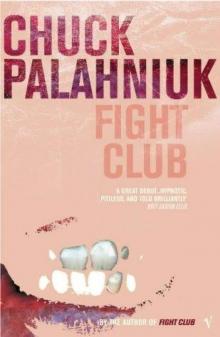 Fight Club
Fight Club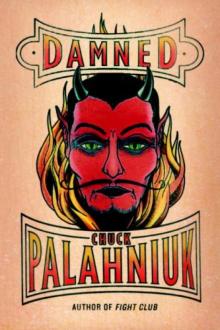 Damned
Damned Tell-All
Tell-All Choke
Choke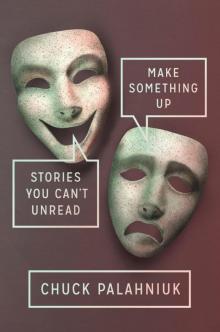 Make Something Up: Stories You Can't Unread
Make Something Up: Stories You Can't Unread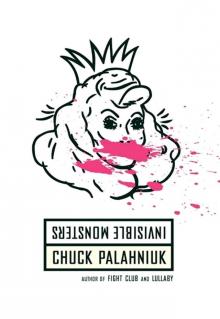 Invisible Monsters
Invisible Monsters Phoenix
Phoenix Beautiful You: A Novel
Beautiful You: A Novel Haunted
Haunted Survivor
Survivor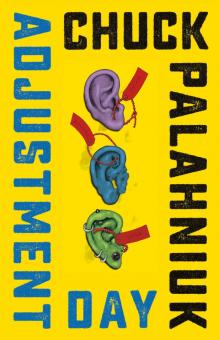 Adjustment Day
Adjustment Day Pygmy
Pygmy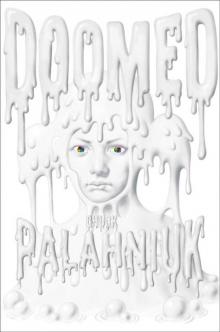 Doomed
Doomed Lullaby
Lullaby Snuff
Snuff Burnt Tongues
Burnt Tongues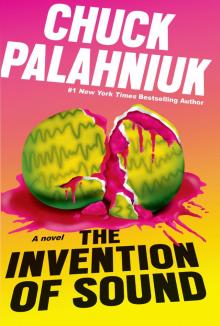 The Invention of Sound
The Invention of Sound Stranger Than Fiction (True Stories)
Stranger Than Fiction (True Stories) Rant: The Oral History of Buster Casey
Rant: The Oral History of Buster Casey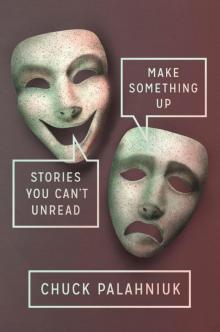 Make Something Up
Make Something Up Rant: An Oral Biography of Buster Casey
Rant: An Oral Biography of Buster Casey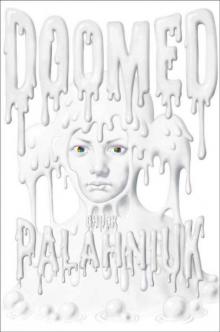 Doomed d-2
Doomed d-2 HOPE AND GORY
HOPE AND GORY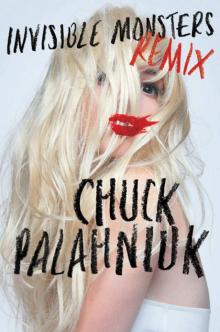 Invisible Monsters Remix
Invisible Monsters Remix Beautiful You
Beautiful You Fugatives & Refugees
Fugatives & Refugees